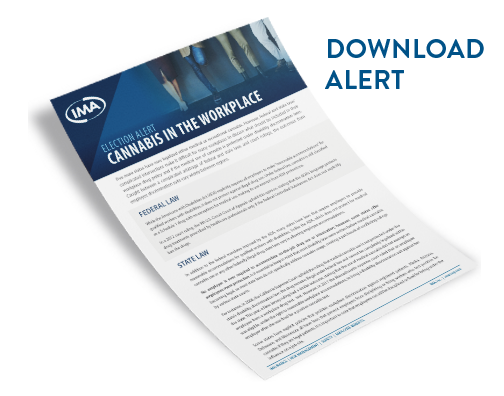NOVEMBER 9, 2020 | 3 MIN READ
Cannabis in the Workplace
OVERVIEW
Five more states have now legalized either medical or recreational cannabis. However, federal and state laws’ complicated intersections make it difficult for many workplaces to discern what should be included in their workplace drug policy and if the medical use of cannabis is protected under disability discrimination laws.
Caught between a complicated arbitrage of federal and state laws and court rulings, the outcomes from employee discrimination suits vary widely between regions.
Federal Law
While the Americans with Disabilities Act (ADA) explicitly requires all employers to make “reasonable accommodations” for qualified workers with disabilities, it does not protect against illegal drug use. Under federal law, cannabis is still classified as a Schedule 1 drug with no exceptions for medical use, making its use exempt from ADA protections.
In a 2012 court ruling, the 9th U.S. Circuit Court of Appeals upheld this opinion, stating that the ADA’s language protects drug treatments prescribed by healthcare professionals only if the Federal Controlled Substances Act does not explicitly ban the drugs.
State Law
In addition to the federal mandates imposed by the ADA, many states have laws that require employers to provide reasonable accommodations for qualified workers with disabilities. Unlike the ADA, which does not protect for medical cannabis use or any other federally illegal drug, state laws vary in allowing employee accommodations.
No employer is ever required to accommodate on-the-job drug use or intoxication; however, some states offer employees more protection. Is it essential to keep in mind that most disability laws were written before medical cannabis becoming legal, so most state laws do not specifically address cannabis usage, creating a patchwork of conflicting rulings by various state courts.
For instance, in 2008, the California Supreme Court upheld the ruling that medical cannabis use is not protected under the state’s disability discrimination law: the drug remains illegal under federal law and cannot be completely legalized within the state. This year, a New Jersey ruling had a similar outcome, stating that the use of medical cannabis did not exempt an employee from a workplace drug test. test. However, in 2017 the Massachusetts supreme court ruled that an employee was eligible, under the right to reasonable workplace accommodations, to bring a disability discrimination suit against her employer after she was fired for a positive cannabis test.
Some states have explicit policies that prohibit workplace discrimination against registered patients. Alaska, Arizona, Delaware, and Minnesota all have laws that prevent employers from disciplining or firing workers who test positive for cannabis if they are legal patients. It is important to note that employees can still be disciplined or fired for being under the influence on a job site.
Addressing Cannabis in the Workplace
While the laws may still be unclear or unsettled, particularly in states that have recently legalized either medical or recreational cannabis use, employers can help circumvent issues by having a clearly stated workplace policy addressing the use of cannabis. Employers will need to remain informed about changing laws and ensure that any written policies remain updated with the latest information.
To further enhance employee awareness of workplace policy, employers may use acknowledgment forms to have employees state their awareness of any company cannabis policies. It remains to be determined if these forms will hold up in court, but their use may help curb worksite safety risks.
If you are interested in learning more about effectively implementing a cannabis or drug policy at your company, contact your IMA representative.
This material is for general information only and should not be considered as a substitute for legal, medical, tax and/or actuarial advice. Contact the appropriate professional counsel for such matters. These materials are not exhaustive and are subject to possible changes in applicable laws, rules, and regulations and their interpretations.
